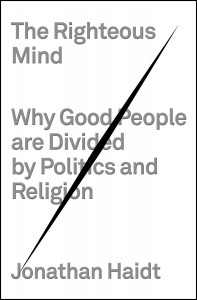Why Can't We All Just Get Along? Bring Your Questions for Righteous Mind Author Jonathan Haidt
 “Morality, by its very nature, makes it hard to study morality,” writes the social psychologist Jonathan Haidt. “It binds people together into teams that seek victory, not truth. It closes hearts and minds to opponents even as it makes cooperation and decency possible within groups.”
“Morality, by its very nature, makes it hard to study morality,” writes the social psychologist Jonathan Haidt. “It binds people together into teams that seek victory, not truth. It closes hearts and minds to opponents even as it makes cooperation and decency possible within groups.”
His new book is called The Righteous Mind: Why Good People Are Divided by Politics and Religion and it is absorbing on so many levels. (It addresses some of the same ideas in a Freakonomics Radio episode called “The Truth Is Out There … Isn’t It?”) Here’s a Times review; here’s one from the Guardian.
I’m pleased to say that Haidt has agreed to take questions on his topic from Freakonomics readers, so ask away in the comments section and as always, we’ll post his answers in short order. To get you started, here’s the table of contents from The Righteous Mind:
Part One: Intuitions Come First, Strategic Reasoning Second
1) Where Does Morality Come From?
2) The Intuitive Dog and Its Rational Tail
3) Elephants Rule
4) Vote for Me (Here’s Why)Part Two: There’s More to Morality than Harm and Fairness
5) Beyond WEIRD Morality
6) Taste Buds of the Righteous Mind
7) The Moral Foundations of Politics
8) The Conservative AdvantagePart Three: Morality Binds and Blinds
9) Why Are We So Groupish?
10) The Hive Switch
11) Religion Is a Team Sport
12) Can’t We All Disagree More Constructively?
This post is no longer accepting comments. The answers to the Q&A can be found here.

Comments